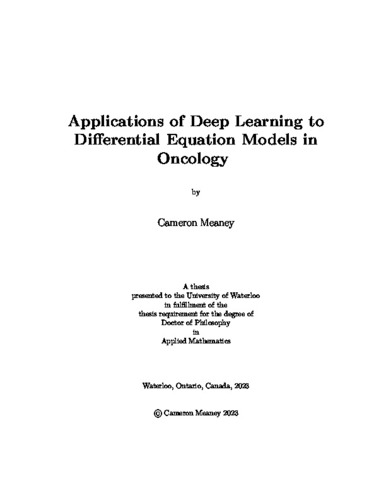| dc.description.abstract | The integration of quantitative tools in biology and medicine has led to many groundbreaking advances in recent history, with many more promising discoveries on the horizon. Conventional mathematical models, particularly differential equation-based models, have had great success in various biological applications, including modelling bacterial growth, disease propagation, and tumour spread. However, these approaches can be somewhat limited due to their reliance on known parameter values, initial conditions, and boundary conditions, which can dull their applicability. Furthermore, their forms are directly tied to mechanistic phenomena, making these models highly explainable, but also requiring a comprehensive understanding of the underlying dynamics before modelling the system. On the other hand, machine learning models typically require less prior knowledge of the system but require a significant amount of data for training. Although machine learning models can be more flexible, they tend to be black boxes, making them difficult to interpret.
Hybrid models, which combine conventional and machine learning approaches, have the potential to achieve the best of both worlds. These models can provide explainable outcomes while relying on minimal assumptions or data. An example of this is physics-informed neural networks, a novel deep learning approach that incorporates information from partial differential equations into the optimization of a neural network. This hybrid approach offers significant potential in various contexts where differential equation models are known, but data is scarce or challenging to work with. Precision oncology is one such field.
This thesis employs hybrid conventional/machine learning models to address problems in cancer medicine, specifically aiming to advance personalized medicine approaches. It contains three projects. In the first, a hybrid approach is used to make patient-specific characterizations of brain tumours using medical imaging data. In the second project, a hybrid approach is employed to create subject-specific projections of drug-carrying cancer nanoparticle accumulation and intratumoral interstitial fluid pressure. In the final project, a hybrid approach is utilized to optimize radiation therapy scheduling for tumours with heterogeneous cell populations and cancer stem cells.
Overall, this thesis showcases several examples of how quantitative tools, particularly those involving both conventional and machine learning approaches, can be employed to tackle challenges in oncology. It further supports the notion that the continued integration of quantitative tools in medicine is a key strategy in addressing problems and open questions in healthcare. | en |

